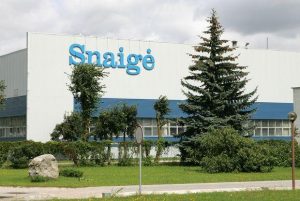
The Lithuanian company Snaige, the only manufacturer of household refrigerators and freezing equipment in the Baltic States, in January-September 2020 reduced its revenue in Ukraine by 16.3% compared to the same period in 2019, to EUR 4.504 million.
According to the published unaudited annual report of the company, Snaige’s loss in Ukraine during this period decreased by one third, amounting to EUR 2,000.
In general, the consolidated unaudited turnover of Snaige for January-September 2020 decreased by 14% compared to the nine months of last year, to EUR 22.3 million.
According to Snaige AB CEO Mindaugas Sologubas, quoted in the report, the decline in sales is a consequence of the global pandemic and quarantine.
“Due to the restrictions imposed by the quarantine, the company’s plant in Alytus was forced to work at partial capacity for several months in the spring, some employees were idle. There was a shortage of supplies, as many suppliers were located in the countries affected by the pandemic,” he said.
As noted, in the third quarter of this year, the company’s sales recovered and almost reached the level of the third quarter of last year, but this was not enough to cover the losses incurred in the spring.
At the same time, the company’s unaudited consolidated EBITDA more than doubled in three quarters, to EUR 1.7 million.

The number of requests from Lithuanian enterprises for business development in Ukraine, search for new partners has increased, Ambassador of Lithuania to Ukraine Valdemaras Sarapinas has said.
“From our own experience, we can say that now we see an increase in requests from Lithuanian enterprises for business development in Ukraine, searching for new partners. By the way, the same can be said about Ukrainian enterprises. We observe especially great potential in the introduction of electronic services, as Lithuania has vast experience in this area and is ready to share it with Ukraine,” Sarapinas told Interfax-Ukraine.
He also said that a reduction in the supply chain can also reveal new opportunities for both Lithuania and Ukraine.
“Lithuania can also become an excellent platform from which Ukrainian enterprises can significantly increase their exports to the West. By way of example, I can cite Kormotech company, which moved part of its activities to Lithuania, and this made it possible to take advantage of the EU financial policy and increase its competitiveness in Europe and other markets,” the diplomat said.
At the same time, Sarapinas said that Lithuanian business in Ukraine is faced with such problems as non-transparency of the judicial system, unequal conditions of competition, and administrative pressure on business.
“I am not a businessman, so I can only convey the position that I hear when communicating with our entrepreneurs: Lithuanian business, as, by the way, investors from other foreign countries or local Ukrainian entrepreneurs face the same problems, namely, the lack of transparency of the judicial system, different conditions of competition, administrative pressure on business. In the area of combating these problems, Lithuania and other Western partners are ready to share their experience,” he said.
The ambassador also said that there are several large Lithuanian companies that are now planning investment projects in Ukraine, however, negotiations are underway on this matter.
“It was recently announced that the Novus retail chain, which is operated by the BT Invest investment company, is buying 35 Billa stores. This is the fairly large investment: according to market analysts, the deal is worth about EUR 65 million. There are also few more large Lithuanian companies that are now planning investment projects in Ukraine, however, now it would be better to refrain from commenting, since negotiations are underway,” he said.